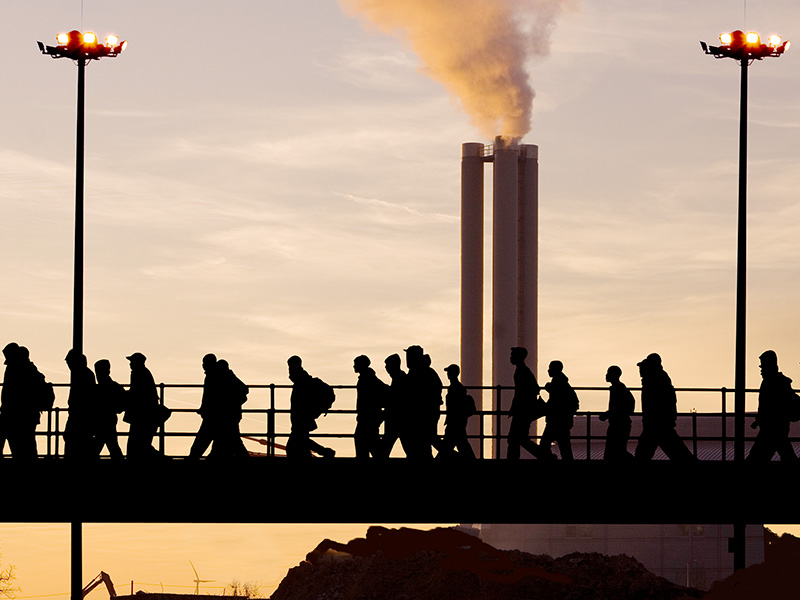
The 2020s dawn with the 50th Annual Meeting of the World Economic Forum (WEF) in Davos, which calls for a cohesive and sustainable world. This first Davos meeting of the “Decisive Decade,” however, comes amid a world in turmoil.
U.S. President Donald Trump returns to Davos just as his impeachment trial opens in Washington. Meanwhile, U.K. Prime Minister Boris Johnson is proclaiming loudly that he wants to achieve a breakthrough as the host of COP26 but has mandated that his government boycott Davos, forfeiting the chance to lobby for climate action in the name of “Getting Brexit Done.” The governments of France and China face challenges to their leadership on the streets of Paris and Hong Kong. Australia continues to suffer horrific wildfires, and Jakarta has suffered monumental floods.
All this means that the new decade has arrived at a time when the global community (if such a thing can even be said to exist right now) is at a crossroads. The need to achieve genuinely shared prosperity and decisive climate action has never been clearer, nor has the science, which is increasingly driving policies and action on climate action and biodiversity. Indeed, the WEF’s latest Global Risks Report, released this week, unprecedentedly cites environmental issues as the top five risks in the world. Peoples’ movements and political figures are calling—ever more loudly—for a fairer economy to reverse growing inequality. And people in the streets are—quite rightly—standing up for the protection of democratic principles that have come under increasing threat.
The need to achieve genuinely shared prosperity and decisive climate action has never been clearer, nor has the science, which is increasingly driving policies and action on climate action and biodiversity.
The answer to this disquiet is found in the following shared goals that broadly reflect the aspirations of the Sustainable Development Goals. And the need for business leaders to recommit to these objectives is more compelling than ever. Entering Davos Week 2020, there is clearly a new climate for business. To face it successfully, here is the agenda that all the leaders who are making the journey should embrace:
- More widely shared prosperity: Markets are trusted less and less each year. Younger Americans are expressing rising support for socialism. There are many reasons for this, but it all boils down to growing concerns about extreme wealth at the top and diminishing opportunities in the middle and lower ends of the economic scale. When the public loses faith in basic economic fairness, no matter what statistics say, change will be demanded. New social contracts are needed to ensure that societies progress together, and fairly.
- Net zero carbon: The number of nations, states, and cities—along with businesses—that have committed to net zero carbon by mid-century is growing fast. Our collective task is to expand these commitments and even more so, translate them into lasting change in the “real economy.” This will achieve more than any COP can.
- Technologies aligned with human rights and ethics: The 2020s will not see technology maximize its benefit to society without greater trust. Something akin to the concept of the precautionary principle applied to old technologies should become the new normal. This may slow the rollout of some ideas and business models, but it will lead to more lasting innovation that society actually supports.
- Women’s empowerment: The fact is that the #MeToo movement risks being left behind as new ideas and crises emerge. This would be a tragic mistake. The 2010s erased any doubt about the unequal treatment of women in business. The 2020s need to be a time when more women are CEOs and Directors, pay equity becomes a reality, and all women are able to pursue opportunities to contribute in all fields the same way men are.
- Support for open societies: Finally, business cannot stand aside while the principles on which open societies are based are being attacked. CEOs are reluctant to step into “political” issues, but there is a clear need for basic civil liberties to be supported. Business depends on stable operating environments to succeed, including the rule of law, fair treatment of all people, the protection of democratic processes, and the protection of global human rights. There is risk involved in supporting these bedrock principles…but there is more risk is allowing them to vanish.
As we pointed out in our Doing Business in 2030 scenarios, the road ahead likely will be marked by increased decentralization of power and influence. While Davos may be an example of the abiding influence of the most powerful, the world away from the Magic Mountain is increasingly influenced by a diverse array of actors.
What the world so urgently needs is action, with far more commitment than we have seen in the half century since Davos launched.
Stakeholder capitalism is embedded into the program at Davos this year—that’s fantastic. The latest “Larry Fink Letter” on the eve of Davos signals that capital markets are moving faster to meet the challenge. But this more equitable and sustainable vision of capitalism must be more than a theme, a process, or a matter of talk. It needs to reflect a seriousness of purpose and a commitment to an agenda that resonates not only in Davos but in the places where people believe that Davos Man (and increasingly, Woman) are ignoring their needs.
The stakeholder model advanced 50 years ago by Forum Founder and Executive Chairman Klaus Schwab is the right one. Making it work in a fragmenting world is no small thing. Davos often frames global debates, and that is no small thing, though conference themes come and go. What the world so urgently needs is action, with far more commitment than we have seen in the half century since Davos launched. If we are to achieve human progress—and avoid exacerbating the turmoil that greets the 2020s—over the course of the coming decade, we have no choice. And the prize—truly shared prosperity that averts climate crisis—should be all the motivation we need.
BSR’s latest sustainability insights and events straight to your inbox.
Topics
Let’s talk about how BSR can help you to transform your business and achieve your sustainability goals.








